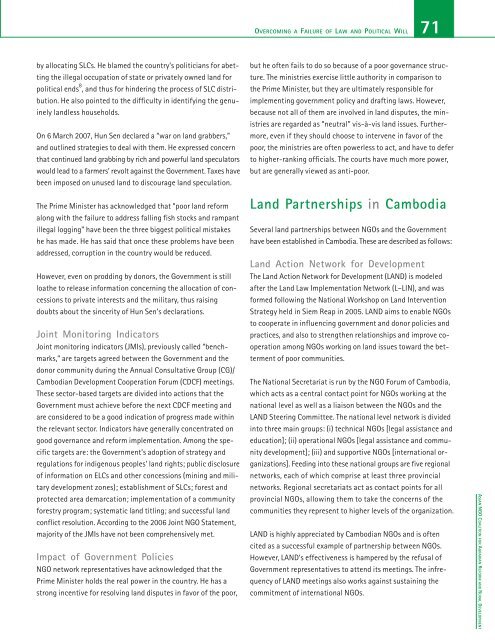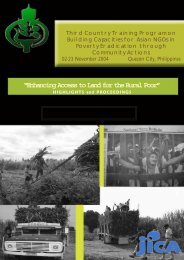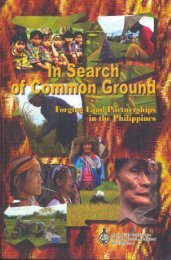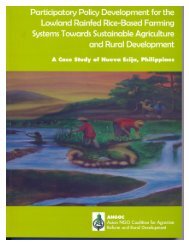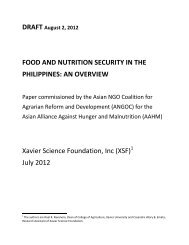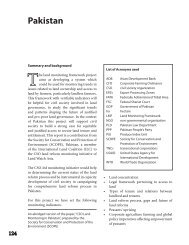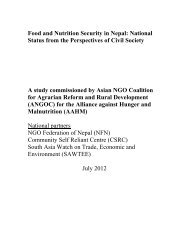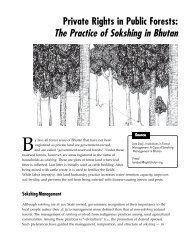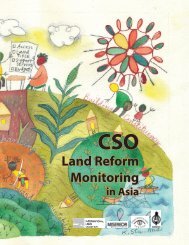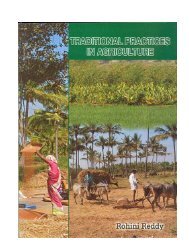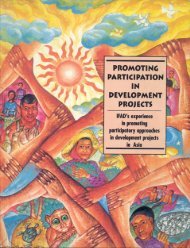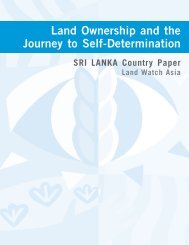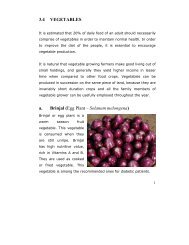Securing the Right to Land FULL - ANGOC
Securing the Right to Land FULL - ANGOC
Securing the Right to Land FULL - ANGOC
Create successful ePaper yourself
Turn your PDF publications into a flip-book with our unique Google optimized e-Paper software.
y allocating SLCs. He blamed <strong>the</strong> country’s politicians for abetting<br />
<strong>the</strong> illegal occupation of state or privately owned land for<br />
political ends 8 , and thus for hindering <strong>the</strong> process of SLC distribution.<br />
He also pointed <strong>to</strong> <strong>the</strong> difficulty in identifying <strong>the</strong> genuinely<br />
landless households.<br />
On 6 March 2007, Hun Sen declared a “war on land grabbers,”<br />
and outlined strategies <strong>to</strong> deal with <strong>the</strong>m. He expressed concern<br />
that continued land grabbing by rich and powerful land specula<strong>to</strong>rs<br />
would lead <strong>to</strong> a farmers’ revolt against <strong>the</strong> Government. Taxes have<br />
been imposed on unused land <strong>to</strong> discourage land speculation.<br />
The Prime Minister has acknowledged that “poor land reform<br />
along with <strong>the</strong> failure <strong>to</strong> address falling fish s<strong>to</strong>cks and rampant<br />
illegal logging” have been <strong>the</strong> three biggest political mistakes<br />
he has made. He has said that once <strong>the</strong>se problems have been<br />
addressed, corruption in <strong>the</strong> country would be reduced.<br />
However, even on prodding by donors, <strong>the</strong> Government is still<br />
loa<strong>the</strong> <strong>to</strong> release information concerning <strong>the</strong> allocation of concessions<br />
<strong>to</strong> private interests and <strong>the</strong> military, thus raising<br />
doubts about <strong>the</strong> sincerity of Hun Sen’s declarations.<br />
Joint Moni<strong>to</strong>ring Indica<strong>to</strong>rs<br />
Joint moni<strong>to</strong>ring indica<strong>to</strong>rs (JMIs), previously called “bench-<br />
marks,” are targets agreed between <strong>the</strong> Government and <strong>the</strong><br />
donor community during <strong>the</strong> Annual Consultative Group (CG)/<br />
Cambodian Development Cooperation Forum (CDCF) meetings.<br />
These sec<strong>to</strong>r-based targets are divided in<strong>to</strong> actions that <strong>the</strong><br />
Government must achieve before <strong>the</strong> next CDCF meeting and<br />
are considered <strong>to</strong> be a good indication of progress made within<br />
<strong>the</strong> relevant sec<strong>to</strong>r. Indica<strong>to</strong>rs have generally concentrated on<br />
good governance and reform implementation. Among <strong>the</strong> specific<br />
targets are: <strong>the</strong> Government’s adoption of strategy and<br />
regulations for indigenous peoples’ land rights; public disclosure<br />
of information on ELCs and o<strong>the</strong>r concessions (mining and military<br />
development zones); establishment of SLCs; forest and<br />
protected area demarcation; implementation of a community<br />
forestry program; systematic land titling; and successful land<br />
conflict resolution. According <strong>to</strong> <strong>the</strong> 2006 Joint NGO Statement,<br />
majority of <strong>the</strong> JMIs have not been comprehensively met.<br />
Impact of Government Policies<br />
NGO network representatives have acknowledged that <strong>the</strong><br />
Prime Minister holds <strong>the</strong> real power in <strong>the</strong> country. He has a<br />
strong incentive for resolving land disputes in favor of <strong>the</strong> poor,<br />
OVERCOMING A FAILURE OF LAW AND POLITICAL WILL<br />
71<br />
but he often fails <strong>to</strong> do so because of a poor governance structure.<br />
The ministries exercise little authority in comparison <strong>to</strong><br />
<strong>the</strong> Prime Minister, but <strong>the</strong>y are ultimately responsible for<br />
implementing government policy and drafting laws. However,<br />
because not all of <strong>the</strong>m are involved in land disputes, <strong>the</strong> ministries<br />
are regarded as “neutral” vis-à-vis land issues. Fur<strong>the</strong>rmore,<br />
even if <strong>the</strong>y should choose <strong>to</strong> intervene in favor of <strong>the</strong><br />
poor, <strong>the</strong> ministries are often powerless <strong>to</strong> act, and have <strong>to</strong> defer<br />
<strong>to</strong> higher-ranking officials. The courts have much more power,<br />
but are generally viewed as anti-poor.<br />
<strong>Land</strong> Partnerships in Cambodia<br />
Several land partnerships between NGOs and <strong>the</strong> Government<br />
have been established in Cambodia. These are described as follows:<br />
<strong>Land</strong> Action Network for Development<br />
The <strong>Land</strong> Action Network for Development (LAND) is modeled<br />
after <strong>the</strong> <strong>Land</strong> Law Implementation Network (L–LIN), and was<br />
formed following <strong>the</strong> National Workshop on <strong>Land</strong> Intervention<br />
Strategy held in Siem Reap in 2005. LAND aims <strong>to</strong> enable NGOs<br />
<strong>to</strong> cooperate in influencing government and donor policies and<br />
practices, and also <strong>to</strong> streng<strong>the</strong>n relationships and improve cooperation<br />
among NGOs working on land issues <strong>to</strong>ward <strong>the</strong> betterment<br />
of poor communities.<br />
The National Secretariat is run by <strong>the</strong> NGO Forum of Cambodia,<br />
which acts as a central contact point for NGOs working at <strong>the</strong><br />
national level as well as a liaison between <strong>the</strong> NGOs and <strong>the</strong><br />
LAND Steering Committee. The national level network is divided<br />
in<strong>to</strong> three main groups: (i) technical NGOs [legal assistance and<br />
education]; (ii) operational NGOs [legal assistance and community<br />
development]; (iii) and supportive NGOs [international organizations].<br />
Feeding in<strong>to</strong> <strong>the</strong>se national groups are five regional<br />
networks, each of which comprise at least three provincial<br />
networks. Regional secretariats act as contact points for all<br />
provincial NGOs, allowing <strong>the</strong>m <strong>to</strong> take <strong>the</strong> concerns of <strong>the</strong><br />
communities <strong>the</strong>y represent <strong>to</strong> higher levels of <strong>the</strong> organization.<br />
LAND is highly appreciated by Cambodian NGOs and is often<br />
cited as a successful example of partnership between NGOs.<br />
However, LAND’s effectiveness is hampered by <strong>the</strong> refusal of<br />
Government representatives <strong>to</strong> attend its meetings. The infrequency<br />
of LAND meetings also works against sustaining <strong>the</strong><br />
commitment of international NGOs.<br />
ASIAN NGO COALITION FOR AGRARIAN REFORM AND RURAL DEVELOPMENT


